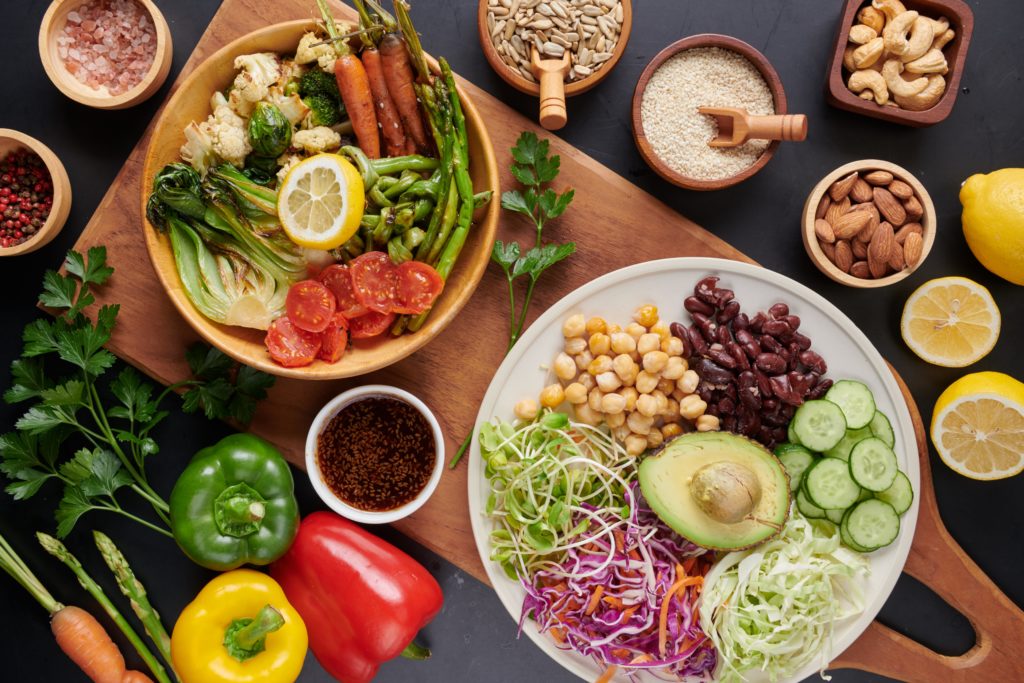Discover the richness of veganism and its protein sources
Veganism, a lifestyle based on animal ethics, is becoming increasingly popular in modern society. As well as being an ethical choice, more and more people are adopting this lifestyle for its many health benefits. However, one question often comes up: how can vegans get enough protein in their diet without animal products?
In this article, we’ll explore the many sources of plant-based protein available to vegans. You’ll be surprised to discover that there is a wide variety of protein-rich foods, making it easy for vegans to meet their nutritional needs while supporting their lifestyle choice.
We’ll explore different categories of plant protein-rich foods, focusing on their nutritional value, digestibility, and contribution to a healthy, balanced diet. We’ll also look at the additional benefits of plant proteins, such as their low saturated fat content and their contribution of fiber, vitamins, and essential minerals.
Whether you’re vegan, curious to learn more about veganism or simply looking for new sources of protein, this article will provide you with the information you need to better understand and appreciate the benefits of plant proteins.
Understanding the protein requirements of vegans
Introduction to protein requirements
Proteins play an essential role in our diet, as they are responsible for the growth, repair, and maintenance of body tissues. For vegans, who exclude animal products from their diet, it is important to understand the protein requirements specific to this lifestyle.
The differences between the protein requirements of vegans and non-vegans
Protein requirements can vary from one person to another depending on factors such as age, sex, level of physical activity and health goals. For vegans, it’s important to note that their protein requirements may be slightly higher than those of non-vegans. This is because plant proteins can be less digestible, and some animal protein sources contain all the essential amino acids.
Nutritional recommendations for vegans regarding proteins
Nutritional recommendations for vegans suggest a daily protein intake sufficient to meet their needs. Health bodies generally recommend an intake of around 0.8 to 1 gram of protein per kilogram of body weight. However, it should be noted that individual needs may vary, and it is best to consult a health professional or nutritionist for personalized recommendations.
It is also important to consider the quality of plant proteins. Animal proteins are considered ‘complete’ sources, as they contain all the essential amino acids required by the human body. Plant proteins, on the other hand, can be ‘incomplete’ in the sense that they may lack certain essential amino acids. However, by judiciously combining different sources of plant protein, it is entirely possible to obtain a complete and balanced amino acid profile.
In conclusion, vegans need to pay particular attention to their protein intake to ensure that their nutritional needs are met. In the following sections, we’ll explore the different sources of plant protein available, offering vegans a variety of options for meeting their protein needs while maintaining an ethical and environmentally friendly lifestyle.
The different sources of plant protein
Legumes: a solid base of plant proteins
One of the most popular sources of plant protein for vegans is legumes. These dried-fruit plants, such as beans, peas, and lentils, are not only rich in protein, but also in fiber and a range of other health-boosting nutrients.
- Beans and peas
Beans, whether red, black, white or any other variety, are versatile foods that are rich in protein. They also contain fiber, complex carbohydrates and a range of essential vitamins and minerals. Peas, whether green, yellow, or split, are another excellent source of vegetable protein. They are also rich in fiber and micronutrients such as vitamin C and potassium.
- Lentils
Lentils are a particularly good source of vegetable protein for vegans. They are easy to prepare and come in several varieties, such as green, brown, and red lentils. Lentils are rich in fiber, iron, folate, and antioxidants, making them a nutritious choice to supplement protein requirements.
- Chickpeas
Chickpeas are very versatile and can be used in a variety of dishes, from salads to curries to hummus. They are rich in protein, dietary fiber, folic acid, iron, and zinc. Chickpeas are also an excellent source of low-glycemic carbohydrates, making them beneficial for blood sugar management.
Pulses are a solid basis for vegetable protein in a vegan diet. In addition to their protein content, they provide fiber, quality carbohydrates and a variety of essential vitamins and minerals. By incorporating pulses wisely into your meals, you can easily meet your protein needs while enjoying the many health benefits of these nutritious foods.
Cereals and pseudo-cereals
As well as legumes, cereals and pseudo-cereals are another important category of plant protein sources for vegans. Not only are these grains rich in protein, but they also provide complex carbohydrates, fiber, and a variety of beneficial nutrients.
- Quinoa
Quinoa is often considered a superfood because of its high content of high-quality protein. It contains all the essential amino acids, making it a complete source of protein for vegans. What’s more, quinoa is rich in fiber, iron, magnesium, and B vitamins, making it a nutritious and versatile choice.
- Brown rice
Unlike white rice, brown rice is an excellent source of vegetable protein. It is also rich in fiber, B vitamins, magnesium, and selenium. Brown rice is a basic ingredient in many vegan dishes and can be used as a side dish or in salads and stir-fries.
- Buckwheat
Despite its name, buckwheat is not a cereal, but a pseudo-cereal. It is naturally gluten-free and can be used in a variety of dishes. Buckwheat is a source of high-quality vegetable protein and also contains fiber, iron, magnesium and antioxidants that are beneficial to health.
By incorporating cereals and pseudo-cereals such as quinoa, brown rice, and buckwheat into your vegan diet, you can not only increase your protein intake, but also enjoy the added nutritional benefits of these nutritious grains. Be sure to include a variety of grains in your meals to get the full range of nutrients.
Nuts, seeds, and oil butters
As well as legumes and cereals, nuts, seeds, and oilseed butters are an excellent source of vegetable protein for vegans. They are also rich in essential fatty acids, fiber, antioxidants, and other health-promoting nutrients.
- Almonds
Not only are almonds delicious, but they are also an excellent source of plant protein. They are rich in monounsaturated fatty acids, fiber, vitamin E, magnesium, and antioxidants. Almonds can be eaten raw, toasted or in the form of almond butter, making them versatile and easy to incorporate into your daily diet.
- Chia seeds
Chia seeds are small black seeds rich in protein, fiber, and omega-3 fatty acids. They are also an excellent source of calcium, magnesium, and antioxidants. Chia seeds can be added to smoothies, yoghurts, puddings and used as an egg substitute in vegan recipes.
- Peanut butter
Peanut butter is a popular source of vegetable protein. It is rich in monounsaturated fatty acids, protein, fiber, and vitamin E. Peanut butter can be spread on bread, added to smoothies, or used as an ingredient in many vegan recipes.
By incorporating nuts, seeds, and oil butters such as almonds, chia seeds and peanut butter into your diet, you can not only increase your protein intake, but also benefit from the essential nutrients they provide. Make sure you eat a variety of nuts and seeds to get the full range of health benefits.
Soya-based products
Soya-based proteins are one of the most common sources of vegetable protein used by vegans. Soya offers a wide range of protein-rich products that can be incorporated into many vegan dishes and recipes.
- Tofu
Tofu is made from coagulated and pressed soya milk and is an excellent source of vegetable protein. It is also rich in calcium, iron, and minerals. Tofu is versatile and can be used in a variety of dishes, such as stir-fries, stews, curries, and marinades.
- Tempeh
Tempeh is a soya-based product that is fermented and pressed into blocks. It is rich in protein, fiber, and health-giving nutrients. Tempeh has a firm texture and a nutty flavor, making it a versatile ingredient for vegans. It can be sliced, marinated, and grilled, or crumbled for use in sauces, stews, and vegan burgers.
- Textured soya protein
Textured soya protein, also known as ‘textured vegetable protein’ or ‘soya granules’, is a dehydrated soya-based product with a texture like minced meat. They are an excellent source of protein and can be rehydrated and used in dishes such as spaghetti sauces, vegan chili or vegan meatballs.
Soya-based proteins offer a versatile, protein-rich alternative for vegans. Whether in the form of tofu, tempeh or textured soya proteins, these soya-derived products are not only nutritious, but also adaptable to a variety of culinary preparations.
Other sources of plant protein
As well as legumes, cereals, nuts and soya-based proteins, there are other interesting sources of plant protein for vegans. These foods can be included in your diet to diversify your protein intake.
- Seitan
Seitan, also known as ‘meat wheat’, is a product made from wheat gluten. It is an excellent source of protein and can be used as a meat substitute in many vegan dishes. Seitan has a firm texture and a nutty flavor, making it a popular choice for people looking for an alternative to meat.
- Seaweed
Seaweed, such as spirulina and chlorella, are often overlooked sources of plant protein. They are rich in protein, iron, omega-3 and antioxidants. Spirulina and chlorella are available in powder form and can be added to smoothies, juices, or other preparations to boost your protein intake.
- Green vegetables
Some green vegetables, such as spinach, broccoli, and kale, also contain protein. Although they are not as concentrated in protein as other sources, they can still contribute to your daily intake. What’s more, green vegetables are rich in fiber, vitamins and minerals that are essential for a healthy diet.
By exploring lesser-known sources of protein, such as seitan, seaweed, and green vegetables, you can diversify your vegan diet and get a full range of nutrients. Don’t be afraid to experiment with these foods to discover new flavors and enjoy their health benefits.


Criteria for selecting the best plant-based protein sources
When you opt for a vegan diet and are looking to obtain protein from plant sources, it’s important to choose the best options to meet your nutritional needs. Here are some criteria to consider when selecting your plant-based protein sources:
Complete amino acid profile
Make sure you choose plant protein sources that offer a complete profile of essential amino acids. Amino acids are the building blocks of protein, and all nine essential amino acids must be obtained from the diet. Legumes, soya, quinoa, and soya-based products such as tofu and tempeh are generally considered to be complete sources of plant protein.
Dietary diversity
It is essential to diversify your diet by including different sources of plant protein. This will give you a more complete range of nutrients. Combine legumes, cereals, nuts, seeds, soya-based proteins, and other plant sources in your meals to ensure a balanced intake of protein and other essential nutrients.
Overall nutritional value
As well as protein, consider the overall nutritional value of the plant sources you choose. Look for food rich in fiber, vitamins, minerals, and antioxidants. Pulses, wholegrain cereals, nuts, seeds, and green vegetables are often rich in health-giving nutrients.
Preparation and culinary versatility
Also consider the ease of preparation and culinary versatility of plant protein sources. Choose foods that can be easily incorporated into your recipes and adapted to your culinary preferences. For example, tofu and tempeh can be prepared in a variety of ways, while canned pulses can be added to salads, stews, or main courses.
Individual considerations
Finally, consider your own individual needs and preferences. If you have dietary restrictions, such as allergies or intolerances, make sure you choose plant protein sources that suit your diet. In addition, if you have specific health needs, consult a health professional or nutritionist to ensure that your vegan diet meets your nutritional requirements.
The importance of nutritional balance
When adopting a vegan diet, it’s crucial to ensure that you maintain an adequate nutritional balance to ensure your health and well-being. Although protein is a key element, it’s essential to look at your diet to make sure you’re getting all the nutrients your body needs. Here are some important points to bear in mind:
Macronutrients
As well as protein, make sure you eat enough healthy carbohydrates and fats. Carbohydrates provide your body with energy, while fats are essential for the absorption of fat-soluble vitamins and for hormonal health. Choose sources of complex carbohydrates such as whole meal cereals, vegetables, and fruit, and opt for healthy fats from avocados, vegetable oils and nuts.
Vitamins and minerals
Make sure you eat a variety of fruit, vegetables, and greens to get a wide range of essential vitamins and minerals. Green leafy vegetables, such as spinach and broccoli, are rich in iron, calcium, and vitamin C. Colorful fruits, such as berries and citrus fruits, provide important vitamins and antioxidants. You could also consider taking food supplements for certain nutrients, particularly vitamin B12.
Essential fatty acids
Essential fatty acids, such as omega-3 and omega-6, are important for cardiovascular health, brain function and regulating inflammation. Flax seeds, chia seeds, walnuts and seaweed are good sources of omega-3 for vegans. Make sure you include these foods in your regular diet or consider taking omega-3 supplements, such as flaxseed oil or seaweed oil.
Calorie intake
It’s essential to ensure you get enough calories to meet your daily energy needs. Vegan diets can be rich in fiber and nutrients but can sometimes be lower in calories if portion sizes are too small. Make sure you consume enough calories from a variety of foods to maintain an adequate energy balance.
Individuality and follow-up
Everyone is different, with individual nutritional needs. It’s important to consider your own needs, age, gender, level of physical activity and personal goals. If you have specific concerns or are experiencing symptoms related to your vegan diet, consult a healthcare professional or nutritionist for personalized advice and regular monitoring.
By adopting a balanced approach and taking your whole diet into account, you can maintain a healthy vegan diet and meet your nutritional needs in the best possible way.
Veganism has become an increasingly popular dietary option, and it is entirely possible to obtain adequate protein from plant sources. By diversifying your diet and choosing your plant protein sources wisely, you can easily meet your nutritional requirements.
Pulses, cereals, nuts, soya-based proteins, as well as other lesser-known sources such as seitan, seaweed, and green vegetables, offer a variety of choices for vegans. Each food category brings its own nutritional benefits, and combining different sources will allow you to benefit from a full spectrum of essential nutrients.
Nutritional balance is also essential in a vegan diet. As well as protein, it’s important to consider carbohydrates, fats, vitamins, minerals, and essential fatty acids to ensure a healthy, balanced diet. Everyone has specific needs, so it’s essential to follow your own body signals and consult a health professional if necessary.
Ultimately, veganism can offer an alternative that is both environmentally friendly and beneficial to health. By being aware of the different plant protein sources available and building a balanced diet, vegans can not only meet their nutritional needs, but also enjoy a variety of delicious flavors and textures.





